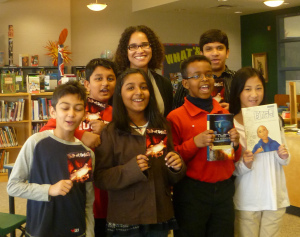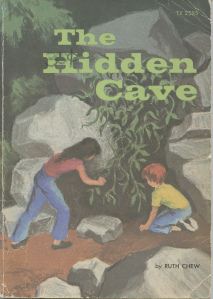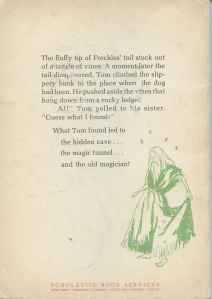Zetta Elliott's Blog, page 76
May 9, 2012
blessed
When I’m not feeling tired and overwhelmed by the many demands of May (8 school visits down, 11 to go), I would say I’ve been feeling quite blessed as of late. I got the Canada Arts Council grant last month, and then learned yesterday that I will receive a faculty development grant from my college. That means I *will* be heading to South Carolina this summer so that I can do the research required to FINISH Judah’s Tale. All I have to do now is finish the semester—two teaching days left, then exams…
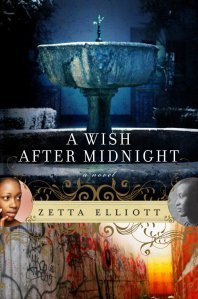 I’ve booked my train ticket to Boston for this year’s Children’s Literature Association conference at Simmons College. Imagine my surprise when I checked the program and discovered that one of my novels is the subject of another presenter’s paper! Mary J. Couzelis will present “Confronting Whiteness in the Past and Present: A Wish After Midnight” on Thursday morning. My train arrives at 10am so I may not make it to the conference in time to catch her paper—but how exciting! And no doubt due to the fact that Michelle Martin, president of ChLA, wrote about Wish in her membership letter last fall…
I’ve booked my train ticket to Boston for this year’s Children’s Literature Association conference at Simmons College. Imagine my surprise when I checked the program and discovered that one of my novels is the subject of another presenter’s paper! Mary J. Couzelis will present “Confronting Whiteness in the Past and Present: A Wish After Midnight” on Thursday morning. My train arrives at 10am so I may not make it to the conference in time to catch her paper—but how exciting! And no doubt due to the fact that Michelle Martin, president of ChLA, wrote about Wish in her membership letter last fall…
Lastly, it’s that time of year again—the New Voices contest is underway. Visit the Lee & Low website for more information—and submit!








May 4, 2012
I just met a girl named Maria…
I’m not a big fan of musical theater and I’ve never actually seen West Side Story, but I caught a glimpse of the film version last month on PBS. And that song just came to mind because today when I was signing books at the BPL, a young woman wearing the hijab came up to me and said, “I really loved this book because everything that Hakeem feels is just what I feel, too! Because he’s Muslim and so am I.” I told her how much that meant to me, but I’m not sure I was able to fully convey my meaning and there was a long line of kids behind her waiting to have their books signed. I won’t start gushing about the Brooklyn Public Library, but this is yet another program that serves the kids in my community—50 kids got a copy of Ship of Souls, and then they came in to hear my author talk and have their books signed. And they were SO ready to talk about the book! I started off with Bird and they kept finding connections to Ship of Souls. There were dozens of hands up in the air by the time I finished my talk, but we only had time for three or four questions. The teachers told me that the entire sixth grade had read the book, and I’ll be going to their school next month to meet everyone else. There’s nothing like seeing kids excited about reading! And, of course, one girl raised her hand and asked, “Will you write a book about us?” I told her that I wrote about Brooklyn and my own neighborhood so that kids like her would see themselves on the page. And half a dozen boys asked when the book will be made into a film. I told them that I had sent the book to Spike Lee (no response so far) and assured them that Nyla’s book was underway…
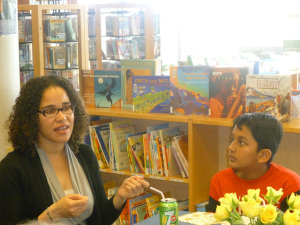 I’ve received some photos of my visit to North Kipling JMS in Toronto—love this shot of our wide-ranging discussion over pizza in the library. So interesting to discuss 9/11 with kids who weren’t even born in 2001…
I’ve received some photos of my visit to North Kipling JMS in Toronto—love this shot of our wide-ranging discussion over pizza in the library. So interesting to discuss 9/11 with kids who weren’t even born in 2001…








May 2, 2012
try, try again
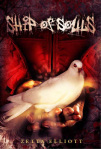 For the month of May you can get 100 titles on Amazon for $3.99 or less! And I’m happy to announce that Ship of Souls is included in this great promotion. I did three school presentations today, and a librarian at one school held up her copy of SoS and asked, “Is this a true story? It feels so real!” She also said she’ll never see Prospect Park the same way now that she’s read about the nether beings…
For the month of May you can get 100 titles on Amazon for $3.99 or less! And I’m happy to announce that Ship of Souls is included in this great promotion. I did three school presentations today, and a librarian at one school held up her copy of SoS and asked, “Is this a true story? It feels so real!” She also said she’ll never see Prospect Park the same way now that she’s read about the nether beings…
Jen Doll has followed up her all-white list of greatest girl characters in YA with another article on “The Ongoing Problem of Race in YA.” I sent her an email after the first piece ran, and others must have shared their concerns as well because she did her homework this time:
It is a sad truth that each girl in my recent list of “The Greatest Girl Characters of All Time” are white. It shouldn’t be that way—but those are the books most of us of a certain age (and class and race) read growing up. The black characters we did get in our books were often peripheral, or were caricatures—or possibly, made to stand as a statement, to educate, to teach a diversity lesson. The latter is not necessarily a bad thing, but it is a bad thing if it’s the only way races other than white are portrayed, and continues to be so.
My own essay on the relationship between the murder of Trayvon Martin and racism in children’s publishing is now up on The Huffington Post. Visit your local bookstore and see how many books YOU can find that feature a black male protagonist…








April 29, 2012
listen up
Having a quiet morning in Toronto—as usual, it’s freezing outside but it IS sunny and I’ve been having a pretty great visit so far. I had to run through the airport to catch my flight on Thursday, but my cousin’s wedding was lovely and I got a chance to catch up with relatives I haven’t seen in a while. The next day I had a full-day visit at North Kipling Junior Middle School and it was absolutely fantastic—I gave six presentations to 18 classes, and had a pizza lunch in the library with 8 students and three educators. I even had three boys who shadowed me all day and solved any technical glitches that came up. I’m always a little anxious when I present before Canadian students because I’m never sure whether my presentation will resonate with them—I write about the US and I know NYC kids really well, but the kids in Toronto are different (only two students raised their hands when I asked who Coretta Scott King was). My first presentation was to a cafeteria filled with seven classes of 7th and 8th grade students. They were SO quiet, maybe even a little timid. I finished the presentation thinking that I’d bombed, but as I walked through the halls later, many of the students waved and smiled and said hello. One senior student in my lunch group said she had been really inspired by my talk, and the other classes were responsive and engaged. And the teachers! I always say that being around teachers feels like being around family; I was raised by two teachers and I’m an educator myself, and I have SO much respect for the men and women who get up every day with a mission to change kids’ lives. I met the district superintendent (who’s a big fan of BIRD) and she recalled sharing Ezra Jack Keats’ books with her own children when they were young because she wanted them to be exposed to children of color. The school principal is determined to integrate the curriculum instead of only inviting black authors during the month of February (YES!). And I owe the entire experience to the vice-principal, Ms. Reid, who “met” me online a couple of years ago and didn’t give up when her efforts to bring me into her previous school didn’t work out. ONE determined educator can make such a difference…
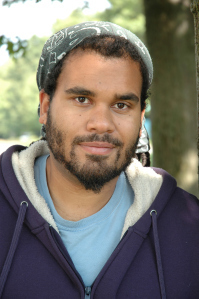 The audio edition of Ship of Souls will be released in May, and I’ve been given permission to share this photo of Benjamin L. Darcie—the man responsible for giving D, Nyla, and Hakeem a voice! I admit that I’m a little anxious—and jealous. I’m used to reading the book to kids myself and I’ve learned how to add certain dramatic flourishes to keep them on the edge of their seat. But Mr. Darcie is a professional actor, so I’m going to trust that he’s better able than I am to bring these characters to life. It would have been cool to hear actual teens reading the book, but maybe that’s a project teachers can develop in their classrooms. I still haven’t done a trailer for Ship of Souls, and goodness knows I’ve got enough on my plate already without taking that on, too. Yet spending the day in Etobicoke made me want to come “home” for a while—just for a few weeks so I can get to know these kids and then write a book just for them. A book set in *their* city, with a cast that reflects the incredible diversity of Toronto. I read Nalo Hopkinson’s The Chaos last week and would love to hear what other folks think of it. It’s great to finally have a spec fic novel for teens that’s set in contemporary Canada and features an all-black cast…
The audio edition of Ship of Souls will be released in May, and I’ve been given permission to share this photo of Benjamin L. Darcie—the man responsible for giving D, Nyla, and Hakeem a voice! I admit that I’m a little anxious—and jealous. I’m used to reading the book to kids myself and I’ve learned how to add certain dramatic flourishes to keep them on the edge of their seat. But Mr. Darcie is a professional actor, so I’m going to trust that he’s better able than I am to bring these characters to life. It would have been cool to hear actual teens reading the book, but maybe that’s a project teachers can develop in their classrooms. I still haven’t done a trailer for Ship of Souls, and goodness knows I’ve got enough on my plate already without taking that on, too. Yet spending the day in Etobicoke made me want to come “home” for a while—just for a few weeks so I can get to know these kids and then write a book just for them. A book set in *their* city, with a cast that reflects the incredible diversity of Toronto. I read Nalo Hopkinson’s The Chaos last week and would love to hear what other folks think of it. It’s great to finally have a spec fic novel for teens that’s set in contemporary Canada and features an all-black cast…








April 20, 2012
icing on the cake
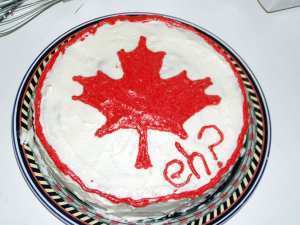 Last night before leaving work I checked my email and found an unpleasant message from across the border. I didn’t bother to respond and instead headed straight to the bakery where I bought a slice of banana cake. I could have done grading on the train ride home, but instead I mused over that email and the neverending drama that is my relationship with my sister. I’m heading to Toronto next week and my mother arranged a little get-together but now I’m pulling out. What’s the point? If you can’t be genuine in your relationships, then you might as well keep your real self to yourself. I got home and found my mailbox crammed full of books–I ordered 25 of Ruth Chew’s 29 books and three or four arrive every day. When I’ll find time to read them all, I don’t know, but the semester wraps up in three weeks and I’m already trying to make a work plan for the summer. I’ve got *18* school visits lined up for the month of May. And I should find out soon whether or not I got the grant to finish Judah’s Tale; that will involve spending a week in South Carolina in July studying maroon communities and rice plantations. I’ve booked my flight and hotel and will be heading to Nevis in June; I’m *really* looking forward to that trip, even though I’ll have to work on a conference paper while I’m there since I’m presenting at ChLA the day after I get back. Then I have a chapter to write on black magic in NYC parks. And then there’s Nyla’s story…
Last night before leaving work I checked my email and found an unpleasant message from across the border. I didn’t bother to respond and instead headed straight to the bakery where I bought a slice of banana cake. I could have done grading on the train ride home, but instead I mused over that email and the neverending drama that is my relationship with my sister. I’m heading to Toronto next week and my mother arranged a little get-together but now I’m pulling out. What’s the point? If you can’t be genuine in your relationships, then you might as well keep your real self to yourself. I got home and found my mailbox crammed full of books–I ordered 25 of Ruth Chew’s 29 books and three or four arrive every day. When I’ll find time to read them all, I don’t know, but the semester wraps up in three weeks and I’m already trying to make a work plan for the summer. I’ve got *18* school visits lined up for the month of May. And I should find out soon whether or not I got the grant to finish Judah’s Tale; that will involve spending a week in South Carolina in July studying maroon communities and rice plantations. I’ve booked my flight and hotel and will be heading to Nevis in June; I’m *really* looking forward to that trip, even though I’ll have to work on a conference paper while I’m there since I’m presenting at ChLA the day after I get back. Then I have a chapter to write on black magic in NYC parks. And then there’s Nyla’s story…
But as I sifted through all the packages I found in my mailbox, I noticed a plain envelope from the Canada Arts Council. Ever since I applied for a grant last fall, the CAC has been sending me stuff; my grant proposal was rejected in March, so I don’t generally bother to read the promotional material they send out. But before chucking this envelope into the recycling bin, I opened it and read the opening lines:
You recently received a letter from the Canada Council for the Arts advising you that your grant application for the Grants to Professional Writers – Creative Writing program was highly recommended. We are now pleased to advise you that your request will be funded.
I read it two or three times before finally moving AWAY from the recycling bin. I don’t understand how this happened, and I plan to call them today to double check, but I am thrilled! And humbled. I don’t have a particularly good history with my homeland, and I try to keep my expectations low to avoid further disappointment. But this grant will enable me to spend a month or so in Ontario researching my ancestors—those who passed for white and those who stayed black. As I scraped the icing off my banana cake last night, I thought about my sister and our ongoing feud—maybe my relationship with her will teach me something about my ancestors. They chose different paths, disowned one another, and—it seems—never looked back. But there had to be moments along the way when those siblings had doubts or wanted to reconcile. I’d like to believe that, at least, though I know that “passing” requires the fair-skinned family member to cut ties completely. I want to write a book about Nevis—two books, actually. And then there’s my academic proposal to write about black magic in YA lit. Something’s gotta give. I love cake but sometimes you have to take a few bites and push the plate away…








April 14, 2012
bite my tongue
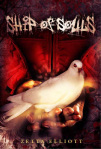 Turns out Booklist is *not* the only kidlit review journal to pay attention to Ship of Souls. We got a “sneak peak” at the upcoming School Library Journal review, and it’s great! Here’s are the concluding lines—the complete review will run in May:
Turns out Booklist is *not* the only kidlit review journal to pay attention to Ship of Souls. We got a “sneak peak” at the upcoming School Library Journal review, and it’s great! Here’s are the concluding lines—the complete review will run in May:
This succinct tale brings well-researched historical background to a compelling urban fantasy. Dmitri’s magical journey through the city’s burial grounds leads him along a deeper emotional one, forcing him to face his grief and acknowledge that more in life is waiting for him. With a suspenseful story that will leave readers feeling inspired, this is a quick and intriguing read.
Thanks, SLJ! You can also watch a video interview with me conducted by Amy Bodden Bowllan, a blogger at the School Library Journal website. Amy runs the Writers Against Racism series and is an outspoken supporter of diversity in children’s literature.








April 13, 2012
proud black geek
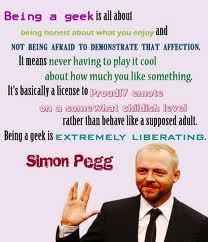 I’m listening to NPR right now and they’re talking about Comic-Con—the “safe space” it creates for comic book lovers who, as children and teens, were ostracized as nerds and geeks. Last week a Facebook friend posted this graphic, which addressed the same issue, and then there was a photo of President Obama with Nichelle Nichols (Lt. Uhura) making the Star Trek sign giving the Vulcan salute (sorry, Trekkies). I’m thinking about getting one of those t-shirts that reads: Black Geek. It might be important for me to wear a shirt like that when I do my author visits. School principals always want to stress that I have a PhD but I didn’t start out wanting to be a professor—I started out dreaming of gnomes and castles and magic beans. So when I sat down to develop an abstract for this book chapter, I reached back into the past for a book that left a lasting impression on my imagination: The Hidden Cave by Ruth Chew. I thought it was about a pair of kids who found Merlin encased in a tree in Central Park, but it turns out the book is set in Brooklyn! So now my paper is
I’m listening to NPR right now and they’re talking about Comic-Con—the “safe space” it creates for comic book lovers who, as children and teens, were ostracized as nerds and geeks. Last week a Facebook friend posted this graphic, which addressed the same issue, and then there was a photo of President Obama with Nichelle Nichols (Lt. Uhura) making the Star Trek sign giving the Vulcan salute (sorry, Trekkies). I’m thinking about getting one of those t-shirts that reads: Black Geek. It might be important for me to wear a shirt like that when I do my author visits. School principals always want to stress that I have a PhD but I didn’t start out wanting to be a professor—I started out dreaming of gnomes and castles and magic beans. So when I sat down to develop an abstract for this book chapter, I reached back into the past for a book that left a lasting impression on my imagination: The Hidden Cave by Ruth Chew. I thought it was about a pair of kids who found Merlin encased in a tree in Central Park, but it turns out the book is set in Brooklyn! So now my paper is
on the significance of urban parks as sites of discovery and recovery in speculative fiction for kids. Chew actually wrote (and illustrated) 29 novels, and almost all of them feature some kind of magic and are set in Brooklyn (where she lived). So as a child in Canada, I read a book about Merlin (because I’m an Arthurian geek, hence my current irrational devotion to Game of Thrones) and as an adult now living in Brooklyn, I’m producing scholarship on that same book (and its relationship to my own novels, which are also set in NYC parks—the African Burial Ground, the Brooklyn Botanic Garden, Prospect Park). Which is why I’m a proud black geek!








April 11, 2012
light a fire
The only good thing about waking at 4am this morning was finding this email from a former student in my Facebook inbox. You've probably heard about the teacher in Michigan who was fired for mobilizing her students around the Trayvon Martin case. Radical teaching—which is what we NEED to achieve social justice—should be celebrated, not punished. You can sign a petition and learn more here.
Greetings,
I know it's been awhile, but I wanted to let you know that I am still following your work and to also, again, thank you for your inspiration and support in my scholastic endeavors. I am currently in my second semester at ___ State University and am in the process of getting my masters in the teaching of writing. I am currently interning for a class titled "Theory of Composition," where we actually just attended a lecture given by Dr. Y. I wrote the following email to my professor, Dr. S, that I thought may be of interest to you and to also remind you, again, of the impact you've had on me as a learner/teacher. Having had some experience as a teacher working in foreign countries for the past three years, I know what it means to receive genuine and honest feedback; it is one of the many things that makes teaching so rewarding. So, I thought I'd send you a copy of the email I sent my professor to not only demonstrate the effect you had on me, but to also demonstrate how the messages we teach, when they are truly meaningful, can spread like wildfire to places or, in this instance, to classes you hadn't imagined.
She then shared my blog with her professor so that their conversation about young adult lit can include a consideration of race and equity in publishing! Touched and very proud…








April 10, 2012
thank you, Booklist!
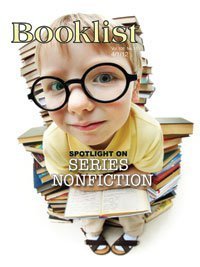 I learned today that Ship of Souls has been selected as a Booklist Magazine top ten Sci-Fi/Fantasy Youth title and will be featured in the May 15th issue! I'm told that this is the issue of Booklist that will be distributed at BookExpo America, so if you're planning to attend BEA, pick up a copy! I've been thinking lately about systems and how many of them are closed—if you're not in the loop, you're out of luck. And even if you manage to fight your way in, obstacles will still be placed in your way (have you seen that animated video about white privilege? The Unequal Opportunity Race). Booklist is the only major kidlit review outlet that reviewed Ship of Souls (Daniel Kraus gave it a starred review). So THANK YOU, Booklist, for giving my book the chance to compete on a level playing field.
I learned today that Ship of Souls has been selected as a Booklist Magazine top ten Sci-Fi/Fantasy Youth title and will be featured in the May 15th issue! I'm told that this is the issue of Booklist that will be distributed at BookExpo America, so if you're planning to attend BEA, pick up a copy! I've been thinking lately about systems and how many of them are closed—if you're not in the loop, you're out of luck. And even if you manage to fight your way in, obstacles will still be placed in your way (have you seen that animated video about white privilege? The Unequal Opportunity Race). Booklist is the only major kidlit review outlet that reviewed Ship of Souls (Daniel Kraus gave it a starred review). So THANK YOU, Booklist, for giving my book the chance to compete on a level playing field.








April 9, 2012
wings
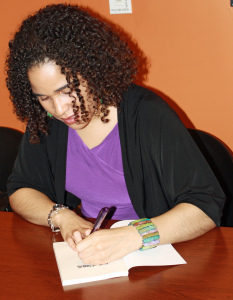 Ever since Downton Abbey wrapped up in February, I've been missing the Sunday night teas I hosted at my apartment. Luckily, I wasn't the only one experiencing "Brit flick" withdrawal, and so last night "the girls" reconvened at my place to watch the conclusion of Great Expectations on PBS. I missed Game of Thrones, but found that two of the characters in GE were in Season 1 of GOT. And at the end of the day—when our post film discussion wrapped up at midnight—I realized that our gatherings aren't really about whatever's on TV. The three of us are writers and professors; we're all trying to finish our respective books, and we all find ourselves—as women of color—having to stop what we're doing to educate others about race. At one point, one of my guests said, "Sometimes I just think people SUCK!" And I laughed because I'd had the exact same thought earlier in the day. I declined an invitation to attend my friend's church and instead went to the park to enjoy the sunshine and blue sky and excited chattering of birds building nests high up in the trees. On my way to the park a seagull swooped down from above and I smiled to myself because the night before I purchased my ticket to Nevis. In mid-June I'll spend one week researching my family roots and plotting out my first adult novel since One Eye Open (tentatively titled The Hummingbird's Tongue). Seeing seagulls in Brooklyn always reminds me that we're on the sea—that despite all the concrete, I live on an island, too, so perhaps my return to Nevis won't be quite so jarring. I circled the park, immersed in my own daydreams, trying to block out the animated conversations of other Brooklynites. "So many people," I thought to myself, "I wish they'd go away." But you can't avoid people on the weekends. So I headed home and then my heart sank as I spotted a pair of wings on the ground. I didn't let myself stop because it was clear that someone had ripped the wings off a toffee-colored pigeon—the wings themselves were lovely, but then I saw the tufts of flesh clinging to the exposed bones and made myself walk on. Who does that? And why? I went home and stayed sullen for most of the afternoon. Made myself start work on the latest academic paper ("No novel-writing for you, missy"), and then baked cookies for my guests. Drizzled honey over some strawberries and washed the teapot, cups, and saucers. I took something to ward off a gathering headache and then my friends arrived and we dove into a recap of our respective weeks. At 11pm I changed the channel to HBO but found our conversation too compelling and so hit mute after the theme music for GOT had played. Somehow we started talking about being confrontational and I reminded my friends that I'm conflict averse. They laughed. "You're always telling people off!" I wasn't indignant, but I was genuinely surprised. I *hate* conflict. I don't even like people all that much, and I certainly don't want to spend my limited social time bickering with idiots. I believe in "strategic silence" but I know that if you always back down, the people who tear wings off helpless birds will run things. And that's not the world I want to live in.
Ever since Downton Abbey wrapped up in February, I've been missing the Sunday night teas I hosted at my apartment. Luckily, I wasn't the only one experiencing "Brit flick" withdrawal, and so last night "the girls" reconvened at my place to watch the conclusion of Great Expectations on PBS. I missed Game of Thrones, but found that two of the characters in GE were in Season 1 of GOT. And at the end of the day—when our post film discussion wrapped up at midnight—I realized that our gatherings aren't really about whatever's on TV. The three of us are writers and professors; we're all trying to finish our respective books, and we all find ourselves—as women of color—having to stop what we're doing to educate others about race. At one point, one of my guests said, "Sometimes I just think people SUCK!" And I laughed because I'd had the exact same thought earlier in the day. I declined an invitation to attend my friend's church and instead went to the park to enjoy the sunshine and blue sky and excited chattering of birds building nests high up in the trees. On my way to the park a seagull swooped down from above and I smiled to myself because the night before I purchased my ticket to Nevis. In mid-June I'll spend one week researching my family roots and plotting out my first adult novel since One Eye Open (tentatively titled The Hummingbird's Tongue). Seeing seagulls in Brooklyn always reminds me that we're on the sea—that despite all the concrete, I live on an island, too, so perhaps my return to Nevis won't be quite so jarring. I circled the park, immersed in my own daydreams, trying to block out the animated conversations of other Brooklynites. "So many people," I thought to myself, "I wish they'd go away." But you can't avoid people on the weekends. So I headed home and then my heart sank as I spotted a pair of wings on the ground. I didn't let myself stop because it was clear that someone had ripped the wings off a toffee-colored pigeon—the wings themselves were lovely, but then I saw the tufts of flesh clinging to the exposed bones and made myself walk on. Who does that? And why? I went home and stayed sullen for most of the afternoon. Made myself start work on the latest academic paper ("No novel-writing for you, missy"), and then baked cookies for my guests. Drizzled honey over some strawberries and washed the teapot, cups, and saucers. I took something to ward off a gathering headache and then my friends arrived and we dove into a recap of our respective weeks. At 11pm I changed the channel to HBO but found our conversation too compelling and so hit mute after the theme music for GOT had played. Somehow we started talking about being confrontational and I reminded my friends that I'm conflict averse. They laughed. "You're always telling people off!" I wasn't indignant, but I was genuinely surprised. I *hate* conflict. I don't even like people all that much, and I certainly don't want to spend my limited social time bickering with idiots. I believe in "strategic silence" but I know that if you always back down, the people who tear wings off helpless birds will run things. And that's not the world I want to live in.
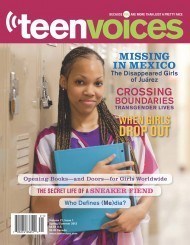 If you haven't seen it already, check out this Atlantic article on "The Greatest Girl Characters in Young Adult Literature." As many of the commenters pointed out, half the books are technically middle grade novels, but my main concern is that not ONE of the characters listed is a girl of color. Yasmin and Erica interviewed me last summer about whitewashing in YA lit, and their fantastic article has been published in the latest issue of Teen Voices. You can , or check it out at your local library. I sent the link to the author of the Atlantic article. Why not send her your comments and suggestions, too?
If you haven't seen it already, check out this Atlantic article on "The Greatest Girl Characters in Young Adult Literature." As many of the commenters pointed out, half the books are technically middle grade novels, but my main concern is that not ONE of the characters listed is a girl of color. Yasmin and Erica interviewed me last summer about whitewashing in YA lit, and their fantastic article has been published in the latest issue of Teen Voices. You can , or check it out at your local library. I sent the link to the author of the Atlantic article. Why not send her your comments and suggestions, too?









